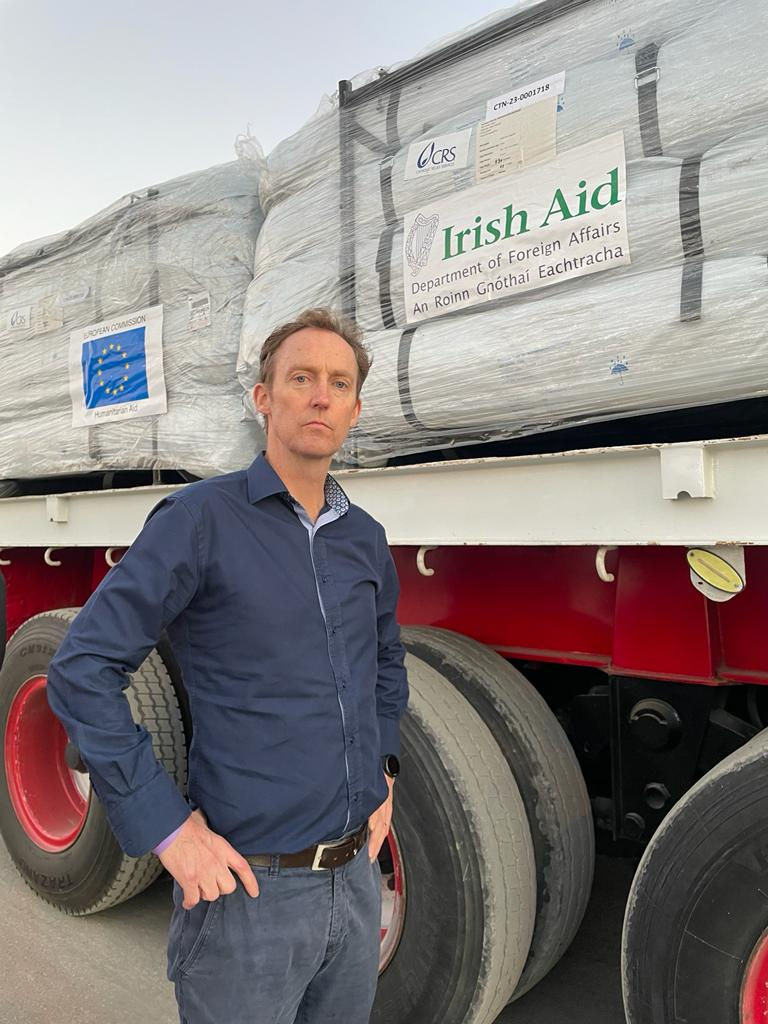Barry Andrews: Response to the crisis in Gaza




I wish to update you on my current priorities and the work I have carried out this far in relation to the conflict, particularly my visit to the Rafah crossing before Christmas (December 2023) to examine the delivery aid to Palestinians, as part of an official European Parliament delegation.
The purpose of this delegation visit was to observe at first hand the process of the delivery of humanitarian aid to Gaza and to Palestinians impacted by the bombardment by the Israeli Defence Forces.
I have attached a full report of this visit to this email for your information. Below are links to my media appearances in relation to the visit, which will give you a sense of what I saw and what I feel needs to be done.
RTE Radio One : https://www.rte.ie/radio/radio1/clips/22334896/
RTE Six One News: https://www.rte.ie/news/player/six-one-news-web/2023/1217/
Virgin Media The Tonight Show: https://www.virginmediatelevision.ie/player/show/1294/214116/0/
Newstalk Pat Kenny: https://link.goloudplayer.com/s/pGGLIvRXzTYJ
My current priorities
1. Humanitarian access:
There can be no humanitarian assistance or recovery without an immediate ceasefire - it is now time for politicians, citizens and the international community to double down on this demand. The humanitarian situation in Gaza is considered by many to be one of the worst man-made disasters in modern history. Over 23,000 in Gaza have been killed, the majority of whom are civilians. This is immoral and constitutes a violation of international humanitarian law, which forbids the targeting of civilians and collective punishment.
At Rafah, I witnessed first-hand how Israeli authorities are deliberately frustrating the delivery of aid. I also visited hospitals and met locals who lives have been irrevocably damaged. The scale of suffering is almost too great to quantify. With record levels of hunger, 58,000 injured and 1.9 million displaced, we need to expedite the delivery of food and medical supplies, and condemn Israel for not providing sufficient access, which is also a violation of international humanitarian law. There is more than enough aid waiting to be delivered at Rafah, this is a deliberate attempt by the Israeli government to frustrate the humanitarian aid process. The ongoing humanitarian disaster is a conscious political decision, not a logistics issue.
2. Diplomatic pressure:
Given that the root of this conflict and the ensuing humanitarian disaster is man-made and political, we need much stronger diplomatic pressure. Though the UN General Assembly voted overwhelmingly for a ceasefire, the recent votes of UN Security Council cast shame on world leaders. I will be sharing my views with an Tánaiste Michéal Martin on the need for Ireland to exert greater pressure on the United States and European Union leadership, in particular, to demand nothing short of a ceasefire, and use any other levers possible to put an end to this horror. The idea that a "pause" will be sufficient to save any lives does not make sense. Once the bombardment stops, it cannot resume. The most effective form of humanitarian aid is peace.
3. Suspending trade:
One such lever is the EU's trading relationship with Israel. The EU is Israel's leading trading partner and the EU-Israel Association Agreement is the closest we have with any country in the world. This gives us both leverage and influence over the Israeli government and its actions. Since November, I have been urging the European Commission to initiate a thorough review of the EU-Israel Association Agreement, with a particular focus on the compliance with the ‘human rights and democratic principles’ clause in Article 2. I believe this review should encompass an evaluation of the situation on the ground, as well as a detailed examination of the impact of the agreement on the human rights situation in the region. As the situation only continues to worsen, I believe this is more relevant than ever.
4. A united front on holding Israel to account:
There is currently much debate around the appropriate means for holding Israel to account, but these debates are often polarizing and detract from the fundamental message: that Israel must be held to account for any war crimes it may have committed. If the international community were to rally around this simple message, the signal to Israel would be much stronger – Israel's actions will not be forgotten.
Since the beginning of this war I have additionally:
-
Condemned the actions of President Netanyahu and European leaders' unequivocal for support for Israel. The statements of President von der Leyen and Commissioner Varhélyi, in particular, were shameful, and did not represent the common EU position nor the views of many EU citizens.
-
Publicly denounced the displaying of the Israeli flag on EU institutions.
-
Called for a ceasefire and demanded the release of hostages and respect for international law by Israel in the European Parliament chamber.
-
Called for the resignation of Commissioner Varhélyi in a letter.
-
Contributed to the European Parliament resolution of 16th October, by tabling amendments on Israel's potential war crimes and calling for a ceasefire. Though a demand for a ceasefire was not approved, the resolution calls for a humanitarian pause.
-
Contributed to a letter by MEPs calling for a ceasefire.
-
Questioned Commissioner Varhélyi on the reasons for delaying funding to Palestine – even before this war.
-
Called for Israel Ambassador to Ireland to come before the Oireachtas (Ireland's Parliament) for questioning.
